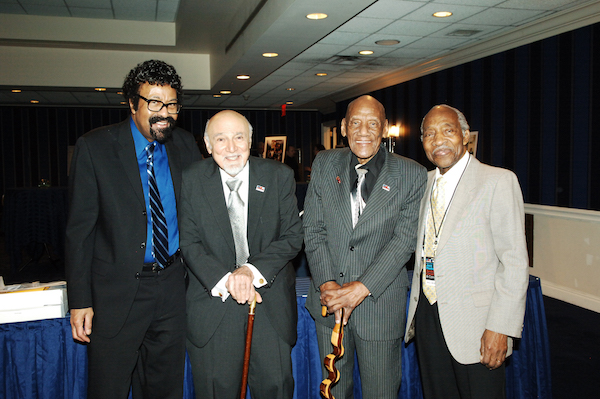Jan 13, 2026 2:09 PM
More Trump-Kennedy Center Cancellations
The fallout from the renaming of the John F. Kennedy Center for the Performing Arts to include President Donald…

NEA Jazz Masters David Baker (left), George Avakian, Candido Camero and Joe Wilder pose for a portrait at the 2010 NEA Jazz Masters Awards Ceremony & Concert.
(Photo: Tom Pich, courtesy of National Endowment for the Arts)Avakian found few jazz artists available to RCA. He approached the Modern Jazz Quartet, but it was not available. Nor were Granz’s strongest artists—Ella Fitzgerald and Oscar Peterson. Count Basie had been signed to Roulette, and Avakian’s Columbia artists were not available—with one exception. Desmond was still with the Brubeck quartet but a free agent for recording purposes. Avakian signed him and turned out a series of extraordinary albums. He also turned to trumpeter Al Hirt, a solid if commercial name on the edge of the jazz world.
Then came Sonny Rollins.
“Sonny seemed different from many jazz musicians of the era,” Avakian says. “He was very serious and sort of mystic. But also a very intelligent person. If you’ve recorded some of the jazz people who didn’t have much in their heads, it wasn’t great fun. Also, Rollins had not been seriously exposed and seemed like a talent who was going to grow into more than he was even then. That made him my No. 1 target. I approached him during an engagement at the Jazz Gallery in the Village. Nesuhi Ertegun was also interested in Sonny, and he made some audition tapes of Rollins at the Gallery. But we were not competitors. He invited me to listen to them, and they were very useful to me in planning the first album, The Bridge. I still have them.”
Avakian signed Rollins, and the contract produced, among other things, The Bridge and a pairing of Rollins and Coleman Hawkins, which, Avakian says, “didn’t jell as I’d hoped. For Sonny, it was a gesture of reverence toward Hawk. For Hawkins, it was a matter of courtesy.”
By the end of 1963, Avakian decided he would never work for a large company again, and left recording almost entirely except for occasional associations with small jazz labels such Chiaroscuro Records and independent productions for Columbia and Atlantic. He managed Charles Lloyd, and then Keith Jarrett, who joined Lloyd in February 1966 when the group played an East Third Avenue club called Slug’s, where Lee Morgan was later stabbed to death by his wife.
In recent years, he has responded to invitations from Columbia Legacy to return to reissues, but with an important difference: Now the reissues he produced and expanded (Armstrong Plays Handy) or to which he contributed annotations (Miles Davis And Gil Evans: The Complete Columbia Studio Recordings, Miles Davis & John Coltrane: The Complete Columbia Recordings) involve many of the classic sessions he initiated during Columbia’s golden age of the ’50s.
As Columbia’s one bona fide living-legend executive, Avakian’s knowledge of the company’s archives is as deep as it is detailed and personal. He personifies a glorious period in the first two decades of the company’s modern history and, along with Mitch Miller, stands as its most illustrious living contributor.
In his days at Columbia, the record business was still something of a cottage industry, which was both a curse and a blessing. The money may have been modest, but the opportunities to accomplish things within a relatively small company were great. Avakian attributes his financial security to the success of the Avakian Brothers rug business and the sale of his New York apartment. Today, he lives well with his family in Riverdale, New York, and at long last he is finding time to put the whole story down on paper. It should be a book to read. —John McDonough

Belá Fleck during an interview with Fredrika Whitfield on CNN.
Jan 13, 2026 2:09 PM
The fallout from the renaming of the John F. Kennedy Center for the Performing Arts to include President Donald…

Peplowski first came to prominence in legacy swing bands, including the final iteration of the Benny Goodman Orchestra, before beginning a solo career in the late 1980s.
Feb 3, 2026 12:10 AM
Ken Peplowski, a clarinetist and tenor saxophonist who straddled the worlds of traditional and modern jazz, died Feb. 2…

The success of Oregon’s first album, 1971’s Music Of Another Present Era, allowed Towner to establish a solo career.
Jan 19, 2026 5:02 PM
Ralph Towner, a guitarist and composer who blended multiple genres, including jazz — and throughout them all remained…

Rico’s Anti-Microbial Instrument Swab
Jan 19, 2026 2:48 PM
With this year’s NAMM Show right around the corner, we can look forward to plenty of new and innovative instruments…

Richie Beirach was particularly renowned for his approach to chromatic harmony, which he used to improvise reharmonizations of originals and standards.
Jan 27, 2026 11:19 AM
Richie Beirach, a pianist and composer who channeled a knowledge of modern classical music into his jazz practice,…